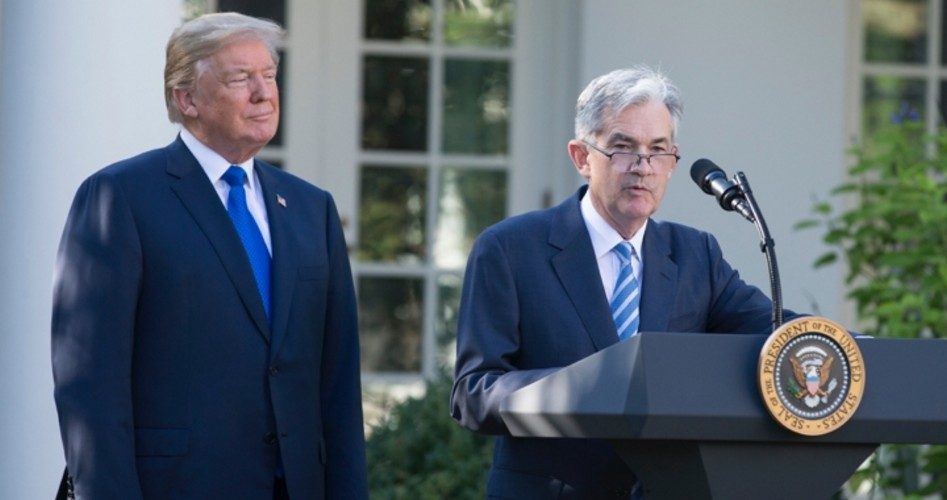
Nothing will change with Trump’s nomination of Powell to head the Fed. He has a strong establishment background and opposed former Congressman Ron Paul’s effort to “Audit the Fed.”
In announcing his pick to replace Federal Reserve Board chair Janet Yellen, President Trump was generous in his praise for Jerome Powell (shown), a present Fed board member: “He’s strong, he’s committed and he’s smart, and if he is confirmed by the Senate, Jay will put his considerable talents and experience to work leading our nation’s independent central bank.” The Fed requires “strong, sound and steady leadership [and Powell] will provide exactly that type of leadership.”
Trump said nothing about either Powell’s establishment background or his opposition to former Congressman Ron Paul’s effort to “Audit the Fed,” which Trump supported during his campaign. As Paul noted in a recent column published by The New American, “Candidate Trump … promised to support Audit the Fed and even voiced support for returning to the gold standard. But, he has not even uttered the words ‘Audit the Fed,’ or talked about any changes to monetary policy, since the election.”
Powell’s establishment credentials go back more than 40 years beginning with attending Princeton University where he graduated in 1975 with a BA in politics. Next he obtained his JD degree from Georgetown University, where he served as editor-in-chief of the Georgetown Law Review. He spent time as a legislative assistant to liberal Republican Senator Richard Schweiker of Pennsylvania before joining the U.S. Treasury Department. He worked under then-Secretary Nicholas Brady, the former chairman of the investment banking firm Dillon, Read & Co. In 1992 then-President George H. W. Bush nominated him to become his under secretary of the Treasury for domestic finance. Over the years he became wealthy, becoming a partner at The Carlyle Group and then founding Severn Capital Partners. He later became a managing partner at the Global Environment Fund before being nominated to the Fed’s board by President Obama in December 2011. In January 2014 Powell was nominated for another term and in June was confirmed by a 67-24 vote in the Senate.
He hid in the shadows of Chair Janet Yellen, rarely expressing a dissenting opinion and always voting with the majority. He supported QE (quantitative easing, the extra-legal actions by the Fed to keep interest rates essentially at zero for years) and Dodd-Frank, the congressional overreaction to the Great Recession which now cripples small banks from operating successfully.
He is the richest member of the board, living in a $3 million home in Chevy Chase Village, Maryland, enjoying golf at the Chevy Chase Club which demands a $50,000 initial fee to join, and driving a Tesla. His financial disclosures show his net worth at between $19.7 million and $55 million. He is a registered Republican and contributed $30,800 to RINO (Republican In Name Only) John McCain’s election campaign in 2008.
Powell is not likely to rock the boat. His life philosophy was summed up by one of his students: “Work hard and keep your head down.” Richard Clarida, global strategic advisor for bond giant PIMCO (which deals in Treasury securities with more than a trillion dollars under management), said of Trump’s pick:
Jerome Powell is a smart choice for Fed chair. He is likely to provide monetary policy continuity by adopting Yellen’s framework of gradually normalizing [interest] rates and … reducing the Fed’s [$4 trillion] balance sheet.
Predictably Powell is a member of the global-government-promoting Council on Foreign Relations (CFR). He added that, if confirmed, “I will do everything within my power to achieve our congressionally assigned goals of stable prices and maximum employment.”
As head of the Fed, Powell will be in charge of an enormous, highly secretive federal bureaucracy that operates with precious little congressional oversight: its 2,700 employees working at the Fed’s 12 regional banks will assist Powell and the board in justifying and then implementing interest-rate decisions, bank regulation under Dodd-Frank, and managing the nation’s phony paper currency. It also serves as a backup purchaser of Treasury securities when needed.
There was a moment in time when Powell stepped out from behind Yellen’s shadow to slap down any attempt to audit the Fed. Speaking in February 2015, Powell took the gloves off:
[Ron Paul’s bill] is motivated by the belief that the Fed’s response during the [real estate collapse] was both ineffective and outside the bounds of its traditional role and responsibilities. In fact, the Fed’s actions were effective, necessary, appropriate, and very much in keeping with the traditional role of the Fed and other central banks.
Second, [his bill asserts that] the Federal Reserve operates in secrecy and was not accountable for its actions during the crisis, a perspective that is in violent conflict with the facts….
Third, and most importantly, I believe [Paul’s bill would] subject monetary policy to political pressure and constrain the Fed’s ability to carry out its traditional role of providing liquidity in a crisis.
As chairman of the Federal Reserve, Powell (reasonably assuming that he is confirmed by a compliant Senate) will guard the Fed’s independence from any interference by Congress, affirming once again that only the “experts” on the board know what they are doing as it continues to manipulate the nation’s currency and short-term interest rates according to its own light.
Put simply, with Powell at the helm of the Fed, the establshment will maintain control.
Photo of Jerome Powell with President Trump: AP Images
An Ivy League graduate and former investment advisor, Bob is a regular contributor to The New American magazine and blogs frequently at LightFromTheRight.com, primarily on economics and politics. He can be reached at [email protected].

